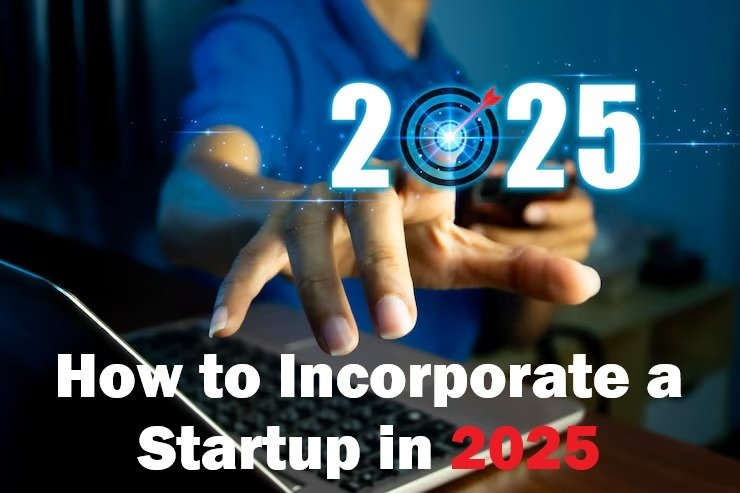Introduction: The New Era of Startups in 2025
The global startup is evolving at lightning speed in 2025. From AI-pushed improvements to blockchain-based structures, marketers are venturing into all-new frontiers. However, no matter how disruptive your concept is, it must be legally recognized to scale, get funding, and perform legitimately. That’s where incorporation is available.
If you’ve been questioning the way to include a startup in 2025, you are no longer alone. This article simplifies the procedure—step by step—for today’s founder. Whether you’re starting your bedroom or collaborating globally, this guide is designed that help you legally launch and shape your startup with confidence.
Why Incorporating Your Startup Matters More Than Ever
Before leaping into the method, let’s understand why you want to include your startup:
- Legal reputation: Gives your commercial enterprise a legal identity that is independent from yours.
- Investor readiness: VCs and angels select to invest in registered entities.
- Tax blessings: Access to startup-friendly tax regimes and deductions.
- Limited liability: Protects your private belongings.
- IP Protection: Secures your logo, trademarks, and improvements.
As you research how to include a startup in 2025, hold those benefits in mind—they’re no longer just office work; they’re your basis.
Step-by means of-Step Process: How to Incorporate a Startup in 2025
Let’s now break down the current roadmap of incorporating a startup this 12 months.
1. Finalize Your Business Idea and Structure
- Choose a precise startup name.
- Decide on the kind of prison entity:
- Sole Proprietorship
- Partnership
- Private Limited Company (Most famous for startups)
- LLP (Limited Liability Partnership)
- One Person Company (OPC)
In 2025, non-public confined agencies and LLPs remain the most founder-friendly due to limited liability, scalability, and investment possibilities.
2. Conduct a Name Availability Search
Go to your organization’s registry (e.g., MCA in India or IRS for EIN inside the USA) and search if the enterprise call is available.
Incorporating a startup begins with a call—make it brandable, simple, and legally feasible.
3. Choose the Right Jurisdiction
Are you planning to expand regionally or expand into worldwide markets?
- India: Incorporate through MCA the usage of the SPICe+ form (fast-track available).
- USA: Incorporate in Delaware (maximum famous for startups), or your private home nation.
- UK: Register with Companies House.
- Singapore/Dubai/Estonia: Popular for tax and digital blessings.
The jurisdiction performs a key role in taxation, investment alternatives, and ease of doing business. Knowing a way to include a startup in 2025, as well as ways knowledge in which to include.
four. Gather Required Documents
Documentation has come to be greater streamlined in 2025 with e-KYC and digital signatures. Here’s what you will want:
- Identity & deal with proof of all founders (PAN, Aadhaar, Passport, and many others.)
- Passport-sized photographs
- Business address evidence (apartment agreement or software invoice)
- DSC (Digital Signature Certificate)
- DIN (Director Identification Number)
- Memorandum of Association (MoA)
- Articles of Association (AoA)
5. Apply for Company Registration Online
Everything is digital now.
- In India, use the MCA portal to record SPICe+ Part A & B.
- In America: File Articles of Incorporation with the Secretary of State.
- In the United Kingdom, submit your software through Companies House.
- Singapore: Use BizFile+ thru ACRA.
Startups can be completed in below 10 days, relying on the accuracy and completeness of the application.
6. Obtain Necessary Licenses and Tax Registrations
- GST/VAT Registration (if relevant)
- Startup India DPIIT recognition (for Indian startups)
- MSME registration
- Import-export license (if required)
- EIN/TAN/PAN (tax ID related to your USA)
Understanding how to contain a startup in 2025 is incomplete without addressing taxation and licenses, which can otherwise delay operations or result in felony troubles.
7. Open a Business Bank Account
Once registered, you will receive your Certificate of Incorporation and tax ID (like PAN/EIN). With these, you could now open a business financial institution account.
Use a reputed fintech or bank that gives zero stability, automated GST compliance, and online banking functions.
eight. Protect Your Intellectual Property
Secure your improvements and branding:
- File for Trademark (name/emblem)
- Register Copyright (content material/software program)
- Apply for Patents (if relevant)
- Sign the NDA and founder agreements
You’ll comprehend the significance of IP safety the moment you pitch to buyers or cross-stay with your product. This step is crucial while understanding the way to start a startup in 2025.
9. Onboard Co-Founders, Advisors, and Team Legally
Use felony contracts to formalize:
- Founder equity splits
- Vesting schedules
- Advisor agreements
- Employee offer letters
- ESOP (Employee Stock Ownership Plan)
2025 startup ecosystems are heavily regulated when it comes to fairness and ownership. Do this right from Day 1.
10. Stay Compliant Post-Incorporation
Many first-time founders forget that compliance is ongoing. Ensure you:
- File annual returns
- Maintain proper bookkeeping
- Conduct board conferences
- Pay taxes on time
- Renew licenses
Being compliant is as crucial as incorporating. Knowing how to incorporate a startup in 2025 additionally approach being ready to run it responsibly.
Key Costs of Incorporating a Startup in 2025
| Expense | Approximate Cost (USD) |
|---|---|
| Name reservation | $10 – $50 |
| Government filing fee | $50 – $300 |
| Digital Signature Certificate (DSC) | $10 – $30 per person |
| Legal drafting (MoA, AoA) | $100 – $500 |
| Trademark Registration (Optional) | $70 – $150 |
| Registered Agent Services (for US/UK) | $100 – $200/year |
| Startup consultant/legal advisor (optional) | $150 – $500 |
Expert Tips: How to Incorporate a Startup in 2025 the Smart Way
- Use Online Platforms: Sites like LegalZoom, IndiaFilings, or Vakilsearch can simplify the process.
- Get Legal Help: A small mistake in your files can delay your startup by using weeks.
- Choose Scalable Structures: Prefer Private Limited or C-Corp for VC-investment compatibility.
- Use Cloud Accounting: From Day 1, tools like Zoho Books, QuickBooks, or RazorpayX can help.
- Apply for DPIIT/Startup Benefits: If you’re in India, this unlocks tax breaks and investment get admission to.
Common Mistakes to Avoid in 2025
- Picking an already trademarked name
- Ignoring founder equity agreements
- Using personal bank bills for business
- Not getting GST/VAT registration on time
- Forgetting post-incorporation compliances
- Not preserving cap tables or ESOP data
Avoid these, and your startup adventure could be smoother, credible, and investor-pleasant.
Real Founder Stories: Incorporation in 2025
Case Study 1: AI-Startup from Delhi
An AI healthcare startup incorporated as a private limited corporation in India in January 2025 using SPICe+ bureaucracy. Within a month, they secured DPIIT popularity and seed funding—all because their documents had been strong from day one.
Case Study 2: SaaS Startup in the US
Incorporated in Delaware using Stripe Atlas. Within 7 days, EIN was received, a US financial institution account was opened, and the startup joined Y Combinator’s software cycle.
Their secret? Understanding the way to include a startup in 2025 in a clever manner—digitally, globally, and legally.
FAQs on How to Incorporate a Startup in 2025
Q.1. What is the best business shape for a startup in 2025?
The maximum favored structures are Private Limited Company (India), C-Corp (USA), or LLP—depending on your funding goals and compliance comfort.
Q.2. How long does it take to incorporate a startup in 2025?
Usually 5–10 business days if the files are accurate. Some international locations now provide speedy-song virtual incorporation in under 48 hours.
Q.3. Can I include my startup without a co-founder?
Yes. Structures like One Person Company (OPC) or Sole Proprietorship permit solo incorporation, even though a few VC funds prefer more than one founder.
Q.4. Do I need a legal professional to include?
Not constantly. Online systems automate maximum prison filings. However, consulting an attorney is suggested for fairness splits, IP, and investment levels.
Q.5. Is it steeply priced to incorporate globally?
Not simply. Incorporating within the US via Stripe Atlas or India through MCA is price-effective. Budget $200–$500, depending on offerings.
Q.6. What are the authorities’ blessings for startups in 2025?
India gives DPIIT recognition, tax exemptions, and patent subsidies. Other international locations like Singapore and Dubai offer tax havens and visa guidance.
Q.7. Can I sign up for a startup online from anywhere?
Yes, 2025 helps full digital incorporation. Tools like DocuSign, eKYC, and virtual office addresses have made global incorporation less complicated.
Q.8. What documents are required for incorporation?
You’ll want identity proof, address proof, commercial enterprise address, MoA, AoA, and digital signatures for all administrators or founders.
Q.9. Do I need a physical office?
Not necessarily. Virtual addresses are desirable in lots of jurisdictions, specifically for digital-first startups.
Q.10. What takes place after incorporation?
Post-incorporation steps include tax registration, establishing a bank account, submitting for IP protection, hiring your team, and staying compliant.
Conclusion
Incorporating your startup can also be daunting, but in 2025, it’s more convenient, digital, and founder-friendly than ever before. With the proper statistics, equipment, and mindset, you could launch your mission legally and expectantly.
This guide on how to start a startup in 2025 provides a realistic, real-world understanding of the steps, costs, mistakes to avoid, and expert techniques to get your business off the ground—legally and correctly.










